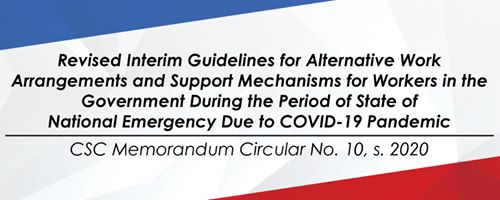
(Eagle News) – The Civil Service Commission (CSC) has issued guidelines for the adoption of alternative work arrangements (AWA) in areas under an enhanced or general community quarantine while the country is under a state of public emergency due to COVID-19.
Under CSC Memorandum Circular No. 10, s. 2020, government agencies may adopt any or a combination of the following work arrangements: work-from-home, skeleton workforce, four-day or compressed workweek, and staggered working hours.
An agency may also adopt “other work arrangements appropriate and applicable to the agency considering the prevailing community quarantine in the area where it is located and the nature of work performed by its employees”, the CSC said in a statement.
Government agencies were directed to formulate internal rules and regulations to implement their chosen AWA, which must include arrangements for employees who travel to and from ECQ and GCQ areas.
The CSC also required agencies to enforce health protocols, such as wearing of face masks and taking of body temperature, and to conduct disinfection and decontamination procedures in their premises.
– Alternative work arrangements for GCQ, ECQ –
Under the CSC guidelines, the work-from-home (WFH) scheme shall be adopted in areas under ECQ, and will be considered as an “option” in areas under GCQ.
WFH shall also be adopted for employees in GCQ areas who are below 21 years old, 60 years old and above, and those who are pregnant and have health risks, “except when their services are indispensable under the circumstances or when office work is permitted.”
On the other hand, skeletal workforce shall be adopted by agencies in GCQ areas, and may be also be allowed in ECQ areas, “unless a different operational capacity is provided in agencies providing health and emergency frontline services, border control, and other critical services”.
“Employees designated as skeletal workforce shall be entitled to Hazard Pay on top of the Compensatory Time Off or Overtime Pay,” the CSC said.
Agencies in GCQ areas may also adopt the four-day or compressed work week arrangement, while staggered working hours may be implemented “as a means to limit the number of employees present at the workplace at any given time.”
Eagle News Service







